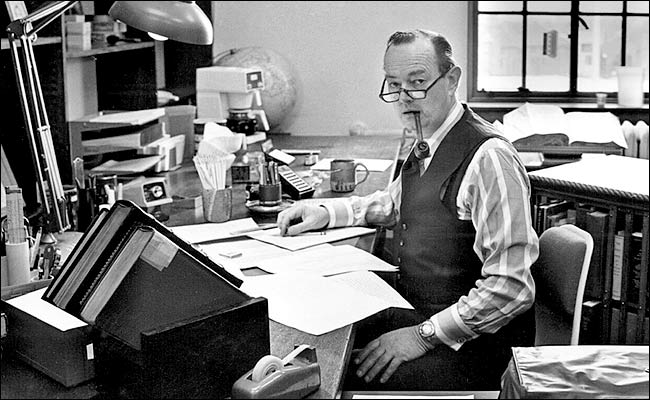Manchester’s Life, Writing Celebrated Feb. 5

During his 82-years of life, author and historian William Manchester made himself known for his writings on Winston Churchill, President John F. Kennedy, Douglas MacArthur, among other great figures.
On Feb. 5, the Friends of the Wesleyan Library will sponsor an event honoring and celebrating Manchester, a writer in residence at Wesleyan whose ties to the university date back to 1955. Manchester died at his home in Middletown, Conn. in June 2004.
“There are so many people on campus who still remember Manchester,” says Leith Johnson, project archivist for Wesleyan’s William Manchester Papers. “Almost all of his books made it onto bestsellers lists. Whether or not you’re part of the Wes community, if you’re interested in writing, you’d be interested in him.”
The event, titled “William Manchester: Portrait of a Writer,” will be held in the Smith Reading Room, located on the first floor of Olin Library. At 7 p.m., Johnson and Jenny Miglus, archival assistant for the William Manchester Papers, will speak about Manchester’s career and writing process as documented in his papers. A brief reception will be held from 7:40 to 8 p.m.
A lecture by Claire Potter, professor of history and American studies, director of the Center for the Americas and chair of the American Studies Program, will follow at 8 p.m. She will provide an overview on Manchester’s achievements as a scholar who wrote works that appealed to a broad public; then move to examine his book, The Death of a President as a part of a larger genre she calls “contemporary history;” and then broaden out to talk about the responsibility of historians to the pubic.
William Manchester was a well-known figure on the Wesleyan campus for over 30 years, serving first as an editor of university publications, then as a fellow of the Center of Advanced Studies, later as adjunct professor of history and writer in residence, and, finally, as adjunct professor emeritus.
Manchester took on iconic subjects, such as the JFK assassination, an analysis of U.S. history from the Depression to Nixon, the complex World War II general Douglas MacArthur and Winston Churchill.
“Then, Manchester researched like crazy, assembling amazing amounts of reference material that he developed complex outlines from. After that, he worked through his drafts. All the while, working night and day at times,” Johnson says. “The end result would be a book that people would then go buy and read. Manchester had his supporters and he had his critics, but no matter what, you have to respect his drive, his output, and his success.”
In his lifetime, Manchester wrote The Glory and the Dream: a Narrative History of America, 1932-1972 (1974); The Last Lion: Winston Spencer Churchill – Visions of Glory, 1874-1932 (1983); American Caesar (1983); Disturber of the Peace: The Life of H.L. Mencken (1986); The City of Anger (1986); One Brief Shining Moment: Remembering Kennedy (1988); A World Lit Only by Fire: The Medieval Mind and the Renaissance (1994); Goodbye Darkness: A Memoir of the Pacific War (2002); among others.
Manchester was most known for his book, The Death of a President (1967). In 1964, Jacqueline Kennedy selected Manchester to write about John F. Kennedy’s assassination. Two years later, she sued him to prevent the publication of The Death of a President, setting off a controversy that played out on the front pages of newspapers around the world.
“Being sued by the former first lady made him one of the most famous writers in the world for a time, but that was notoriety he didn’t want or seek,” Johnson says.
According to The Washington Post, Manchester could write for up to 50 hours at a time in his heyday. But after two strokes and illness, Manchester found himself “grief-stricken by his inability to concentrate even on simple television programs, much less his final, three-volume project, a biography of Winston Churchill. He had to relinquish control of his career-capping work.”
“Language for me came as easily as breathing for 50 years, and I can’t do it anymore,” he told The New York Times in 2001. “The feeling is indescribable.”
When Manchester died, Wesleyan took ownership of the William Manchester Papers, housed in Special Collections & Archives. Many of his books were written in Olin LIbrary. Johnson and Miglus oversee more than 195 linear feet of papers, photographs, artifacts and other archived items that belonged to Manchester.
“Mr. Manchester produced 18 books and dozens of articles and other works, and for each one there may be research materials, notes and correspondence, and drafts,” Miglus says. “There also is a sizable run of personal and professional correspondence; legal and financial records; and personal files, relating to topics as varied as President and Mrs. Clinton, the United States Marine Corps, Wesleyan University and the house he had built on Pine Street.”
Highlights from the Manchester Collection will be on exhibit at Olin Library through March 15.
For event information, contact the Friends of the Library at 860-685-3897.

